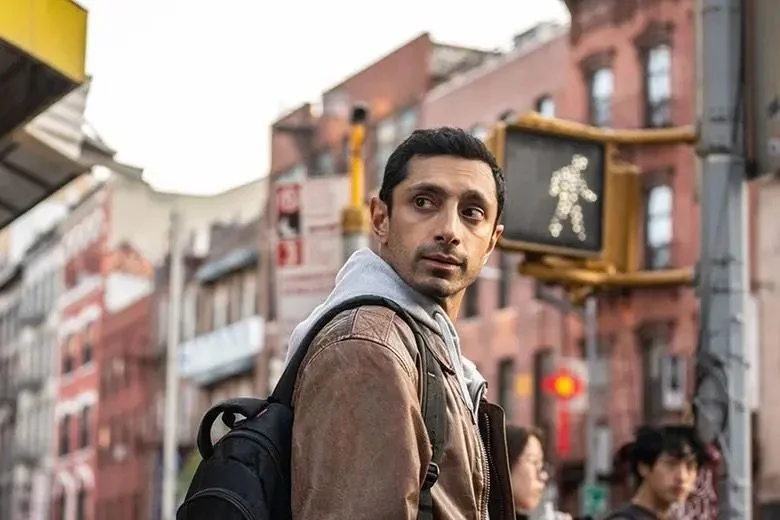‘Relay’ Review: Riz Ahmed Is Electric in a Quietly Explosive Game of Cat and Mouse That Grips Until the Final Frame
Bleecker Street
David Mackenzie’s Surveillance Thriller is Elevated by a Quietly Haunting Turn from Riz Ahmed
“Hello, you’ve received a call from Tri-State Relay Operating Service. Have you received a relay call before?”
Few actors can command a screen while saying almost nothing, but Riz Ahmed delivers a masterclass in restraint in Relay, David Mackenzie’s slow-burning thriller that premiered as part of Tribeca’s Spotlight Narrative section. As Ash, a clandestine broker navigating the murky territory between whistleblowers and the corporations they betray, Ahmed is a magnetic, near-silent force. His stillness is arresting, his quiet gaze more telling than pages of dialogue — and it’s that minimalism that gives Relay its soul.
Set in a version of New York where anonymity is both a survival tactic and an espionage superpower, Relay doesn’t rely on genre tropes or shootouts to generate tension. Instead, it builds suspense through process, paranoia, and the quiet dread of living under constant surveillance. The film opens with a transaction: Ash helps a pharma insider disappear after exposing corporate misconduct. He uses messaging relay services, burner phones, and the often-overlooked protection of snail mail to orchestrate the exchange, disappearing back into his network before anyone knows he was even there.
Mackenzie’s direction is at its sharpest when tracking these analog systems — postal routes, public payphones, shifting disguises — which Ash manipulates with uncanny precision. The camera lingers on city corners rarely seen in glossy New York movies, choosing Brooklyn’s Myrtle-Broadway or a bureaucratic post office lobby over sweeping skyline shots. These details ground the film in a sense of urban realism, heightening its emotional stakes.
But the story’s emotional anchor comes when Ash takes on a new case involving Sarah (Lily James), a conflicted agricultural researcher who stole damning evidence that her company knowingly sold toxic fertilizer. As the two navigate the covert world of document smuggling and corporate retaliation, their dynamic becomes the film’s pulse. Sarah is panicked, volatile. Ash is calculating and cold — at first. The closer they get, the more Relay begins to bend, letting in flickers of vulnerability, intimacy, and, perhaps to its detriment, sentimentality.
Ahmed is never less than riveting. Every micro-expression matters. A subtle eye flick, a barely perceptible jaw clench — they speak volumes. Even in disguise, wearing the nondescript clothes of a delivery driver or an early morning jogger, Ash carries the weight of every decision he’s made and every secret he’s kept. There’s a brilliance to the way Ahmed plays against the film’s themes: a brown man hiding in plain sight, weaponizing the same invisibility that so often puts him at risk. In an era where identity and data are weaponized daily, Ash’s ability to remain faceless becomes both his strength and his deepest curse.
Still, Relay stumbles when it leans too far into emotional territory. The late-film pivot into a more conventional connection between Ash and Sarah dilutes some of the film’s earlier complexity. For a story built on mistrust and surveillance, Ash’s sudden openness feels unearned. The narrative softens just when it should sharpen — a misstep that weakens the film’s final act. Yet even these narrative slips can’t undermine the tactile authenticity of Mackenzie’s world-building or the slow-burn power of his direction. Each sequence unfolds with an almost surgical precision, and the film’s pacing — glacial but never dull — creates a mood of persistent unease.
The supporting performances also shine, particularly Sam Worthington as a menacing corporate enforcer who brings a gravitas that elevates the character beyond stock villainy. His pursuit of Ash creates a parallel storyline of cold efficiency vs. human conscience, and their inevitable clash is handled with subtlety rather than spectacle. Lily James, too, finds unexpected layers in Sarah, transforming what could’ve been a one-note whistleblower into a woman whose guilt, fear, and moral determination all collide in every scene.
Relay is also a film about place — not just its cinematic New York, but the emotional spaces its characters inhabit. Ash's hideouts and safehouses, whether an anonymous apartment in Long Island City or a church basement support group, reflect the fractured identity of a man living half-lives. The urban geography becomes part of the narrative: real corners of real boroughs lending a kind of lived-in gravitas often absent in Hollywood's vision of the city.
David Mackenzie, known for genre flexibility from Starred Up to Hell or High Water, demonstrates once again his ability to adapt form to content. His style here is stripped-down, favoring realism over flourish, function over form — a choice that mirrors Ash’s no-nonsense ethos. Yet Mackenzie’s eye for tension and atmosphere remains razor sharp. With just two episodes screened at Tribeca, it’s clear that Relay is setting up something larger, possibly episodic in structure or designed to reward rewatching for deeper details. That choice alone speaks to a confidence in the material that is increasingly rare in thrillers today.
Relay isn’t trying to reinvent the genre. Instead, it distills it. Like Ash himself, the film moves with stealth and purpose, never drawing more attention than necessary but always leaving a mark. It’s a confident, considered, and quietly powerful work that speaks to the moment without shouting — a film about how much noise it takes to finally hear a whisper.
RATING: ★★★★½
Relay
Festival: Tribeca (Spotlight+ Narrative)
Cast: Riz Ahmed, Lily James, Sam Worthington, Willa Fitzgerald
Director: David Mackenzie
Screenwriter: Justin Piasecki
Run Time: 1 hour 52 minutes









